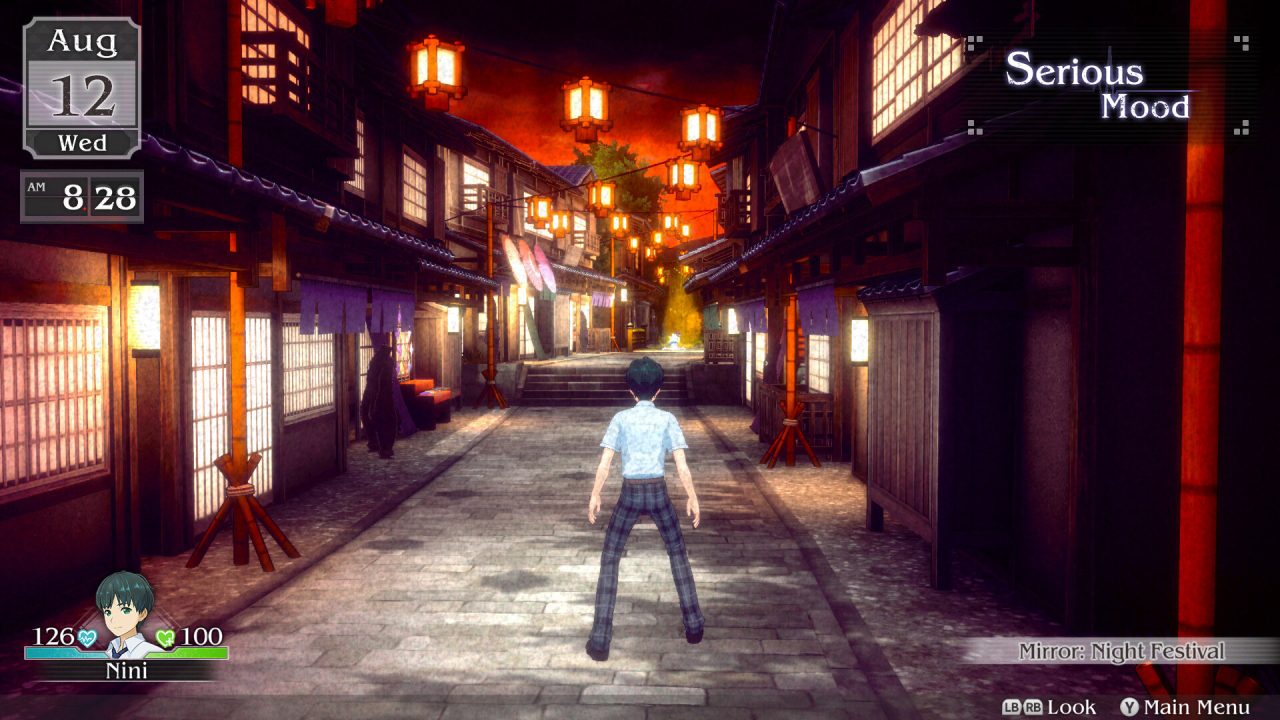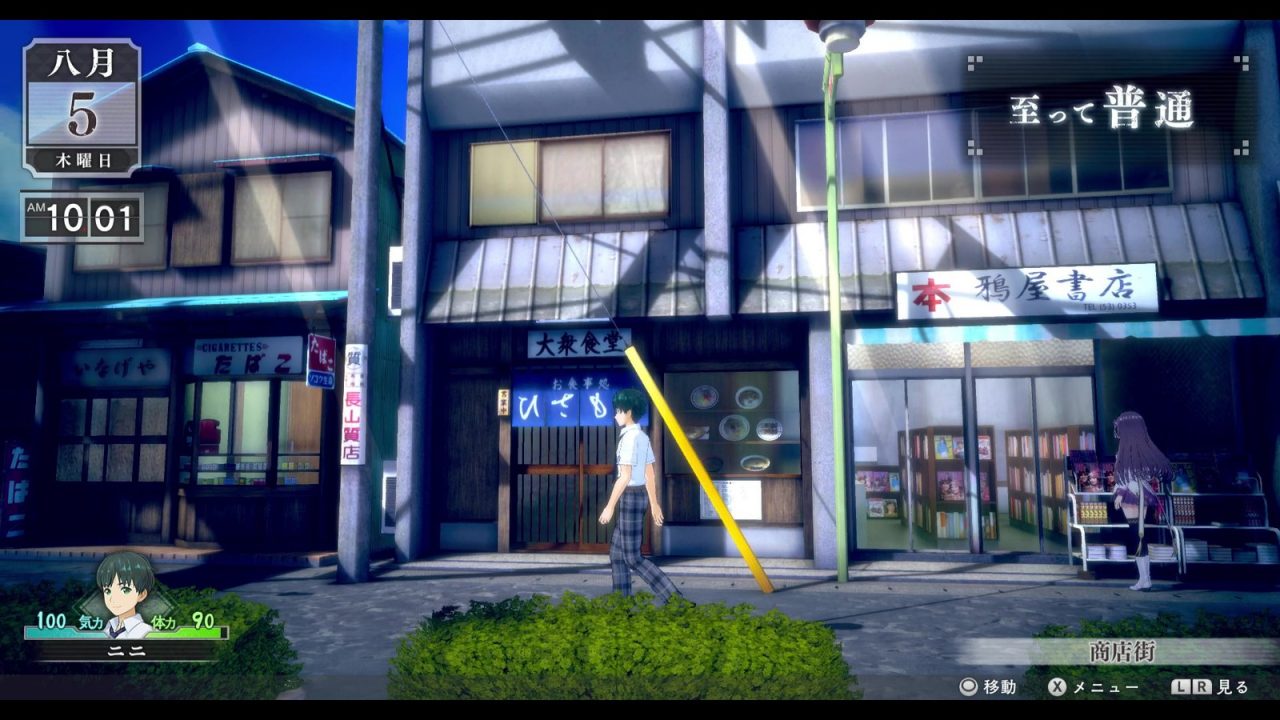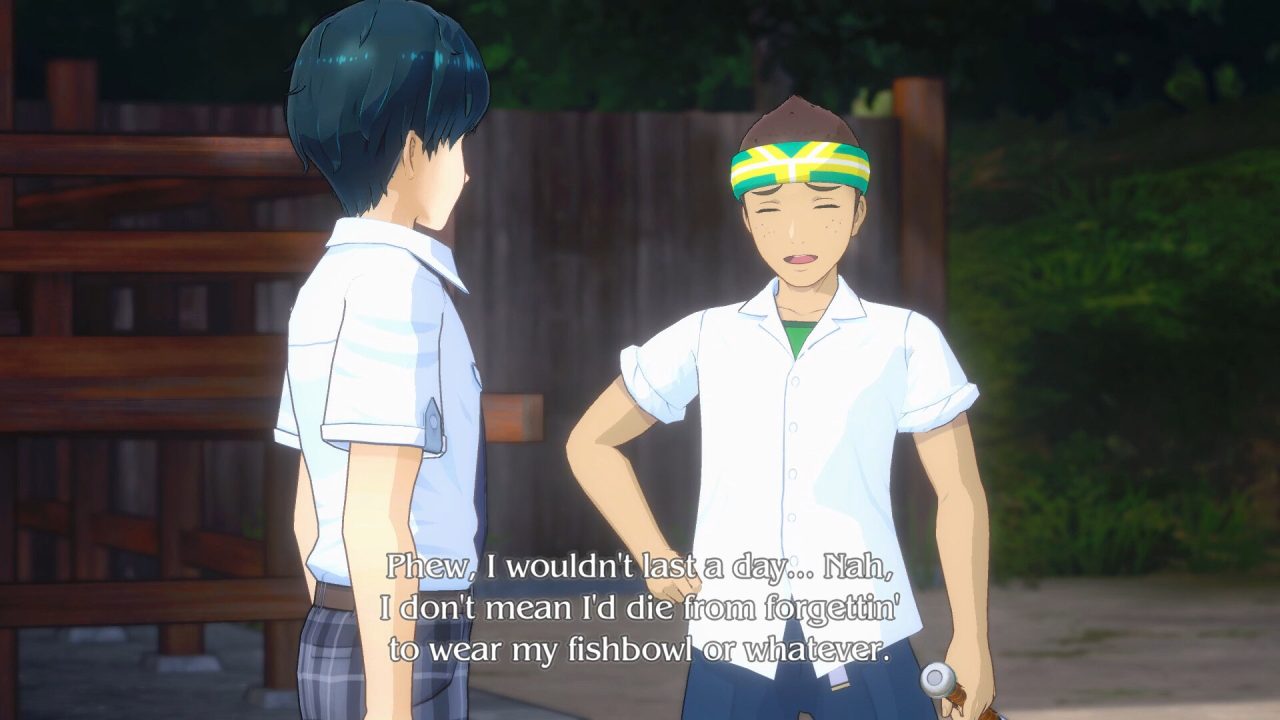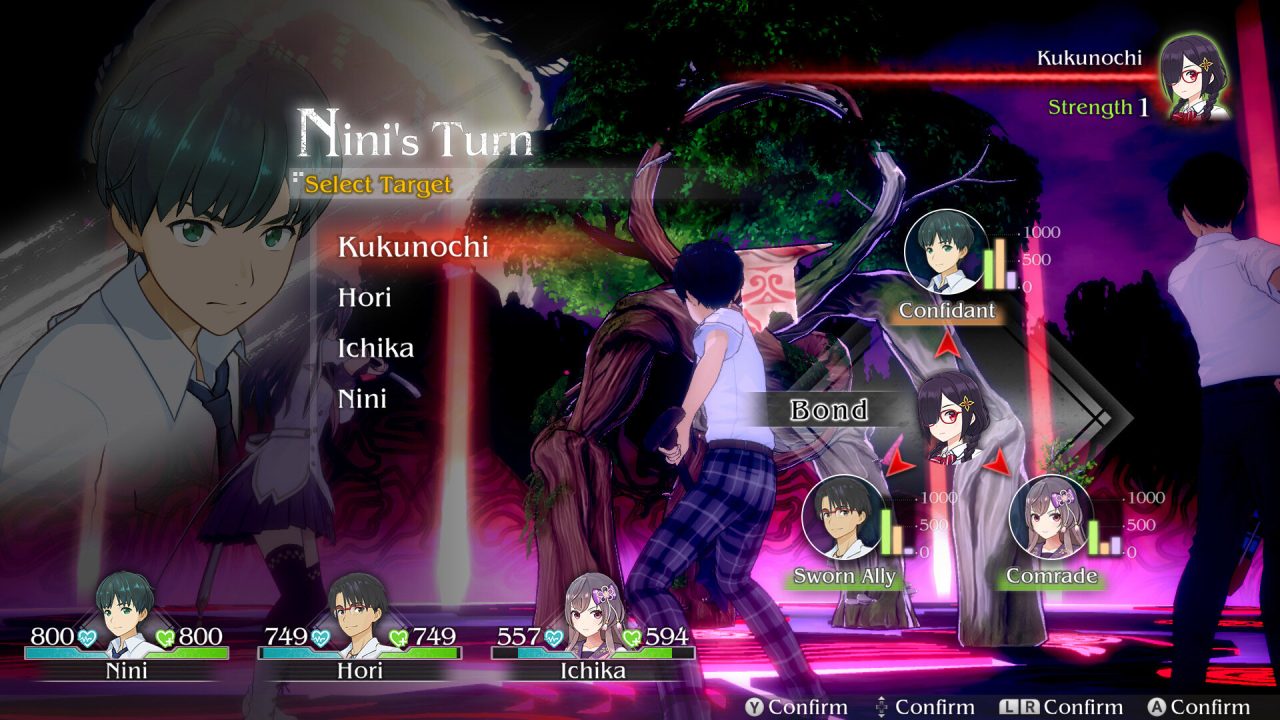I went into Loop8: Summer of Gods with high hopes. Conceived as a spiritual successor to Japan-only cult hit Gunparade March (released on the PlayStation in 2000), developer Sieg Games brought back Gunparade March creator Yuri Shibamura to direct Loop8. Much like its inspiration, Loop8 takes place in an alternate history version of Japan where a group of teenagers must band together and defeat a looming supernatural threat. Loop8 takes a mythological approach, with demons called Kegai invading Earth from the underworld, and our group of plucky teens calling upon the power of the gods to defeat them during the summer of 1983. This premise is exciting, and I was eager to see how this story would unfold alongside the social-sim and RPG elements. Unfortunately, the potential of this unique premise is almost immediately squandered by disjointed and baffling storytelling choices, gameplay that amounts to little more than mashing confirm through boxes of generic dialogue, and half-baked turn-based combat that may as well not exist.
Loop8 has one of the strangest openings to a game that I have ever experienced. The game starts with a catchy animated opening sequence, then has a short cutscene explaining the very basics of the world. The Kegai are demons from the underworld that have taken over Earth and made much of the planet uninhabitable. In response, some human beings fled into space aboard a space station, while others remain in small pockets of the planet that are defended from the Kegai by spiritual barriers. The main character, Nini, is one of the people who fled to space, and has returned to Earth after a disaster aboard the space station killed his family. The game takes place on the remote Japanese island of Ashihara, one of the places protected from the Kegai. Nini has family living on this island, namely his cousin Konoha who gives him a place to stay and introduces him to the small town.
From here you get railroaded into a tutorial explaining the calendar system and various activities you can do such as training or going to class. You’re also introduced to a few of the characters you can interact with on the island. Throughout this process, little in the way of worldbuilding is explained. Some characters remark that Nini used to live in space, and a few talk about the looming threat of the Kegai, but not much is established about the rest of the world. After a few days, you find yourself at the village shrine, where Ichika (a demon-slaying priestess) and Beni (a mischievous fox god) pulls you into Yomotsu Hirasaka. This is an alternate dimension version of town, where the Kegai stage their invasion of the world. You enter combat against a boss and die. When you die, you are sent back to the first day again, and from there you can take over and plan out Nini’s days and activities.

This is how the game shows you its core mechanic that everything else is based around: the loop. When you fall in battle to the Kegai, a loop will trigger, sending you back to the very first day of August. You can also choose to loop whenever you wish by talking to a woman named Kerasu who hangs around town. Many of the game’s problems stem from this structure as, unlike in most roguelike games where runs are quick, loops in Loop8 may come only once every five to eight hours of playtime. Loops are also mandatory to finish the game because of the way accumulating stats and building social status with other characters functions. Most of Loop8’s gameplay consists of running around town as Nini, speaking to any of the 12 characters, training in various stats, and interacting with objects around town to receive blessings from the gods. These blessings are vital, as they confer stats boosts on Nini that carry over between loops.
Unfortunately, the methods for obtaining blessings are boring. There are a few spots around town (mostly shrines) that Nini can interact with to receive a blessing. A magical flying squirrel with the most annoying voice acting I’ve ever heard appears and confers a random stat boost. These blessings can also occur during conversations with other characters, though those blessings tend to buff their stats instead of your own. This happens hundreds of times during a playthrough, and the entire process becomes monotonous and irritating after just a few hours of playing.

Similarly, the way to raise your social standing with each character is to talk to them… over and over again. Occasionally when you speak to a character, they may offer some bit of backstory or details about their interests or personality. Most of the time however, they offer a generic greeting, to which you can respond with a variety of nondescript dialogue options (“Get to Know Each Other,” “Compliment,” “Flatter,” etc.). After selecting an option, the character provides a generic response, and your Friendship and Affection level with them increases. Most conversations play out this way, and these conversations constitute the vast majority of Loop8’s gameplay. I’m not sure why the developers thought it was a good idea to make a 30-hour RPG where 20 of those hours are spent mashing confirm through the most generic and boring dialogue you’ve ever read repeatedly, but here we are.
Even when the characters do have something unique to say, there is little context for what they are talking about and many conversations, especially early on, left me confused. For example, the girl named Machina is a robot, created by Max (one of the teachers at the school) to fight the Kegai. There is basically no introduction to this concept, and for a while I thought her constant references to “recharging her energy levels” were just a quirky manner of speech. Characters often offer bits and pieces of backstory apropos of nothing. Sometimes you walk up to a character and are suddenly transported to an event scene halfway across town where they are pouring their heart out to you with no warning. The relationship-building system and social mechanics feel extremely artificial and boil down to simply “make the number go up.” You never truly feel like you are making friends or building true bonds, which is damning for a game where the social elements are most of the gameplay experience.

The other part of the gameplay is the turn-based combat. Before playing Loop8, I had the impression that it was a mix of dungeon crawler and social sim in the same vein as the Persona series. This is not the case at all. The “dungeon” is just the town with a red and purple filter over it. There are no random encounters, nor are there any mandatory encounters at all except for the bosses you have to defeat to progress the story. There are shadowy figures that wander around the dungeon which represent Kegai, but the only way to initiate combat with them is to talk to them. The only thing stopping you from going to the boss is the need to collect magatama, which are glowing orbs dotted around town. Most of these orbs are simply stat checks. If you have the required stats, you get the magatama. Collect enough and you can unlock the door to the boss. Due to this setup, there is no reason to fight the smaller enemies dotted around town. There are no experience points in this game, so defeating them grants you nothing except a chance to receive a blessing (which you can get much more easily outside of the dungeons). The bosses are characters from town possessed by Kegai, and you are given hints to discover which character is currently possessed. Once you figure out who it is, the door opens, and you can go in and fight the boss.
You need to bring party members with you who have a good relationship with the possessed character. If you bring in characters who the possessed character hates, the boss will be more powerful. One of the biggest issues with combat is, similar to Persona 3 FES, party members are controlled by AI and you cannot give them any commands or even change their tactics. This makes strategy in combat non-existent, and the best strategy for fights is to just have Nini use his strongest attack over and over and hope your teammates do something beneficial. Luckily, if your stats are high enough, all the bosses are a breeze and don’t require any strategy or planning to defeat anyway. If your stats are too low, then there is pretty much nothing you can do, and you will have to loop again to build up stronger stats. This is one of the worst approaches to combat I’ve ever played in an RPG, as it is entirely devoid of player agency.

Pretty much everything in Loop8 boils down to building up your stats past an arbitrary barrier by looping and repeating the same dull, boring conversations and tasks ad nauseum. The characters are tropey and uninteresting, the unique premise is squandered by disjointed storytelling, and the combat is devoid of strategy or depth. The only positive thing I can commend the game for is the visuals, which feature a nice mix of detailed 3D models and lovingly crafted 2D background elements. They really nailed the look of an 80’s Japanese island town, but the actual game is such a chore to play that I can’t recommend it to anyone. Spend your summer somewhere other than Ashihara.


